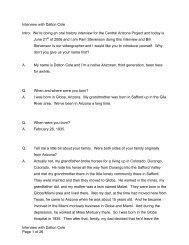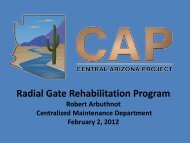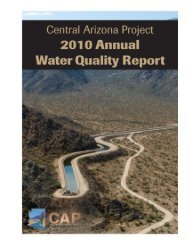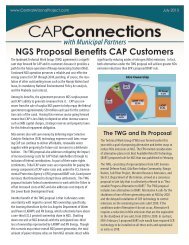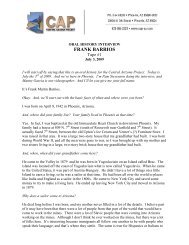Interview with Grady Gammage - Central Arizona Project
Interview with Grady Gammage - Central Arizona Project
Interview with Grady Gammage - Central Arizona Project
You also want an ePaper? Increase the reach of your titles
YUMPU automatically turns print PDFs into web optimized ePapers that Google loves.
the most important constituent group for the <strong>Central</strong> <strong>Arizona</strong> <strong>Project</strong>. And most<br />
of them were sophisticated enough to understand and get it. Some of the<br />
farming interests were allies, but many of them were not. There was a feeling<br />
that our demand that they give up their long term water allocations in exchange<br />
for being relieved from their long term “take or pay” obligations... Seemed to us<br />
made sense, you can’t afford to pay for it, give it back. If we have extra we’ll sell<br />
it to you. And we’ll sell it to you every year but we’ll tell you like five years in<br />
advance how much we think we’re going to have, but you don’t have any<br />
permanent right to it. The benefit, the larger societal management benefit of that<br />
is, and this is why I came to feel keeping agriculture in business is so important,<br />
agriculture is a buffer. In times of drought if you don’t have enough water you<br />
take it back from the farmers and you deliver it to the cities. In times of plenty if<br />
you have extra water give it to the farmers and let them plant some crops. So it<br />
becomes a mechanism to move water in and out of a use. That doesn’t exist in<br />
Nevada for example, they can’t do that. They can’t do that in Southern California<br />
really anymore. They can start now moving water in California from the <strong>Central</strong><br />
Valley to the Coast. California has a big problem. People live and farm in<br />
different places. In <strong>Arizona</strong> we live and farm in essentially the same place, this<br />
corridor between Phoenix and Tucson, is where we use the CAP water. So<br />
we’re urbanizing the area we’re farming. Well if we keep some farming in<br />
business in that area then we can use that agricultural water use as a buffer.<br />
And that’s in fact exactly what we’ve done in the last few years of this drought.<br />
That’s why you can still wash your car any day of the week you want and you<br />
<strong>Interview</strong> <strong>with</strong> <strong>Grady</strong> <strong>Gammage</strong><br />
Page 52 of 91



